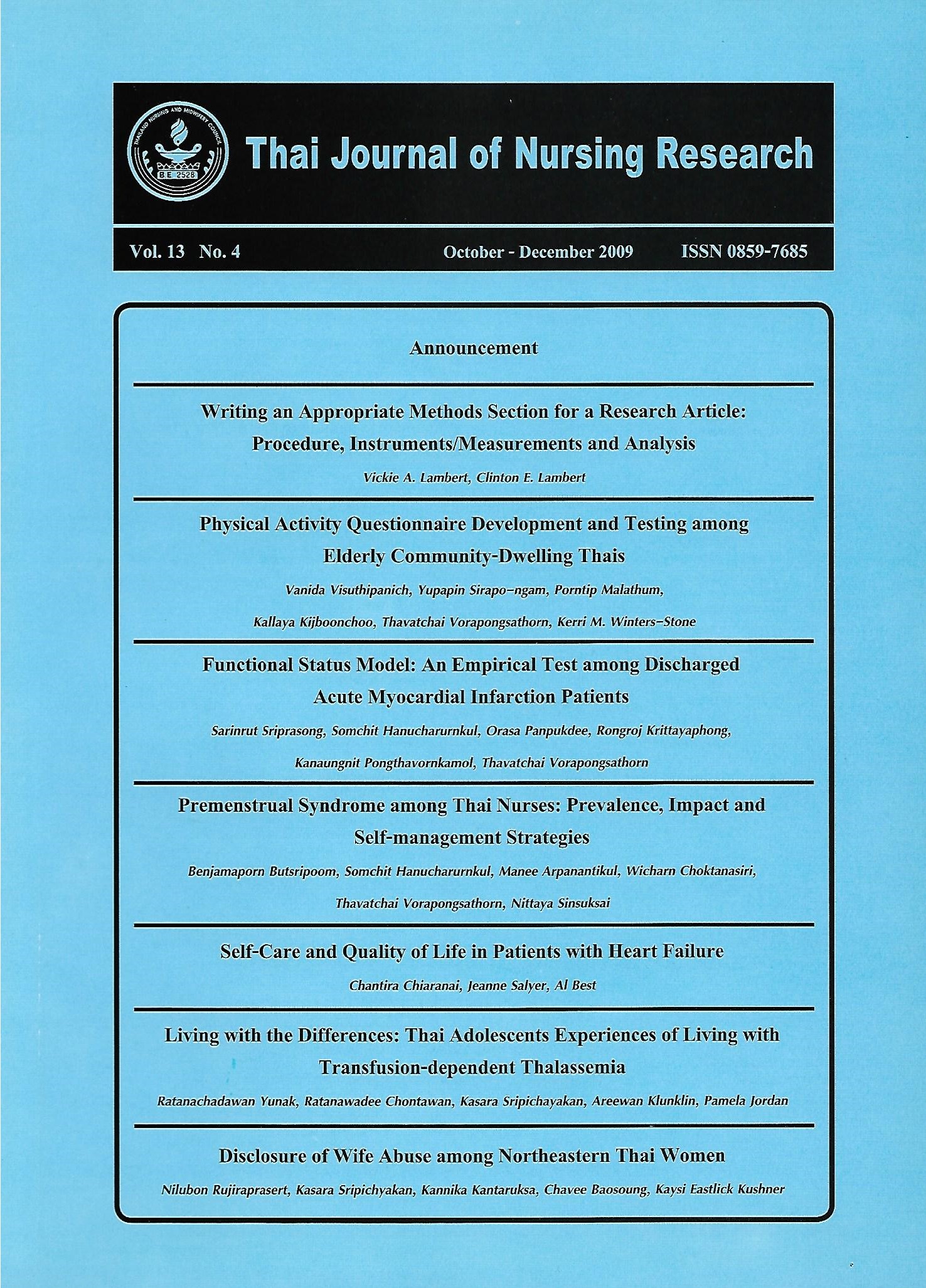Premenstrual Syndrome among Thai Nurses: Prevalence, Impact and Self-management Strategies
Keywords:
กลุ่มอาการก่อนมีประจำเดือน, การจัดการตนเอง, การดูแลตนเอง, premenstrual syndrome, self-management, self-careAbstract
บทคัดย่อ
กลุ่มอาการก่อนมีประจำเดือน (PMS) เป็นปัญหาที่พบได้ทั่วไปในสตรีวัยเจริญพันธุ์ พยาบาลเป็นอาชีพที่จัดได้ว่ามีความเครียด ซึ่งความเครียดสามารถรบกวนระบบการทำงานของฮอร์โมน และสามารถส่งผลกระทบให้ต่ออาการก่อนมีประจำเดือนได้ การวิจัยนี้เป็นการวิจัยเชิงพรรณนาแบบติดตามไปข้างหน้า มีวัตถุประสงค์เพื่อสำรวจความชุกและอธิบายประสบการณ์กลุ่มอาการก่อนมีประจำเดือน ตลอดจนวิธีการดูแลตนเองของสตรีที่มีอาการก่อนมีประจำเดือน โดยใช้เกณฑ์การวินิจฉัยของ ACOG
กลุ่มตัวอย่างเป็นพยาบาล จำนวน 161 คนจาก 4 โรงพยาบาลในกรุงเทพมหานคร อายุระหว่าง 22-45 ปี กลุ่มตัวอย่างใช้แบบบันทึกสุขภาพประจำวัน และแบบบันทึกผลกระทบจากอาการ PMS ทำการบันทึกอาการต่างๆทุกวันเป็นระยะเวลา 2 รอบติดกันของการมีประจำเดือน
ผลการวิจัยพบความชุกของกลุ่มอาการก่อนมีประจำเดือนร้อยละ 16.8 อาการที่พบบ่อยได้แก่ หงุดหงิดง่าย รู้สึกเพลียเหนื่อยล้า เจ็บคัดเต้านม โกรธง่าย รู้สึกท้องโตขึ้น ตึงเครียดและอารมณ์เปลี่ยนแปลงง่าย ระดับความรุนแรงของอาการที่พบค่าเฉลี่ยสูงได้แก่ อยากรับประทานอาหารมากขึ้น อยากรับประทานอาหารบางอย่างเป็นพิเศษ เจ็บคัดเต้านม หงุดหงิดง่าย และรู้สึกควบคุมตัวเองไม่ได้ สำหรับผลกระทบที่พบบ่อยของอาการก่อนมีประจำเดือนคือผลกระทบต่อสัมพันธภาพกับผู้อื่น ส่วนอาการที่ผู้หญิงรู้สึกว่ารบกวนมากที่สุดคืออาการหงุดหงิดง่าย ซึ่งวิธีที่ใช้บ่อยที่สุดในการดูแลตนเอง คือ ลดการพบปะผู้คน
ผลการศึกษาในครั้งนี้ชี้ให้เห็นว่าอาการที่ปรากฏ ระดับความรุนแรงของอาการและผลกระทบเป็นการรับรู้ส่วนบุคคล การบรรเทาอาการใดอาการหนึ่งทำได้หลายวิธี และการดูแลตนเองวิธีใดวิธีหนึ่งสามารถบรรเทาอาการได้มากกว่าหนึ่งอาการ
คำสำคัญ: กลุ่มอาการก่อนมีประจำเดือน การจัดการตนเอง การดูแลตนเอง
Abstract
Premenstrual syndrome (PMS) is a common health problem among reproductive women, and may adversely affect female nurses experiencing stress from their occupation, due to its interference with one’s endocrine function. The purposes of this descriptive prospective study were to: (a) explore the occurrence, intensity and impact of PMS, and (b) describe the type and effectiveness of PMS self-management strategies used by participants. One hundred and sixty-one, 20-45 year old, Thai nurses were recruited from four hospitals in Bangkok. Data related to the occurrence, intensity and impact of PMS were obtained, for two consecutive menstrual cycles, through the use of the Women’s Daily Health Diary (DHD), the General Data Record (GDR) and the Negative Impact section of the Daily Record of Severity of Problems (DRSP). The type and effectiveness of PMS self-management strategies used by the participants were obtained, by way of a telephone interview, using the researcher created Self-Management Measures Questionnaire (SMMQ).
Results revealed the prevalence of PMS to be 16.8%, with the most common symptoms being irritability, fatigue, painful or tender breasts, anger, bloating or swelling of abdomen, tension and rapid mood change. The highest intensity of PMS symptoms included: increased appetite, craving for specific food or tastes, painful or tender breasts, irritability and feeling out of control. Although, interference with relationships was a commonly reported impact symptom of PMS, the most disturbing symptom reported was irritability. The most common self-management technique used to alleviate irritability was to decrease time spent with others.
The findings suggest symptom prevalence, intensity and impact were dependent on the individual’s perceptions at the time. In addition, no one particular strategy or self-management was found to be most effective in managing any given disturbing symptom, as symptoms were managed with a variety of strategies and self-management techniques.
Keywords: premenstrual syndrome, self-management, self-care
Downloads
How to Cite
Issue
Section
License
Copyright: The Pacific Rim International Journal of Nursing Research, Thailand Nursing & Midwifery Council has exclusive rights to publish, reproduce and distribute the manuscript and all contents therein.








.png)



